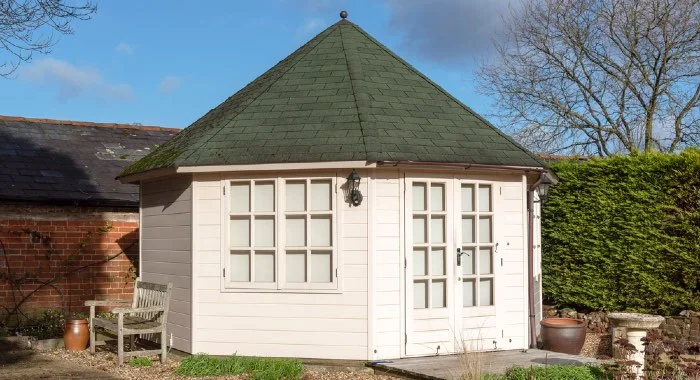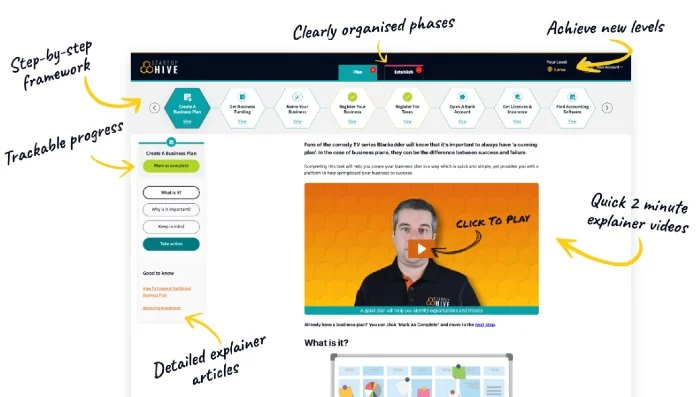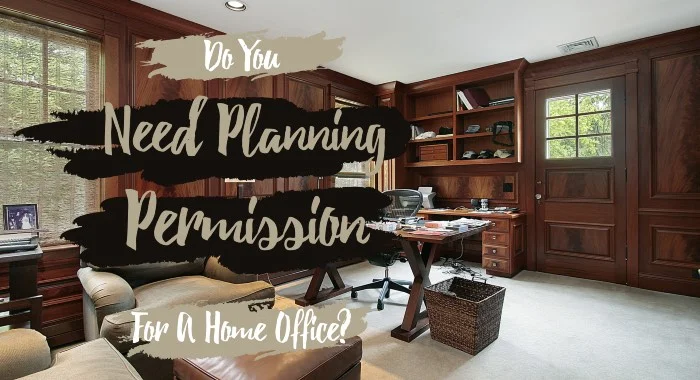Working from home is a cost-effective and flexible solution for most SMEs and start-ups to grow their business. But for many SMEs, working from a spare bedroom or kitchen table can only get you so far before needing to create a dedicated workspace in your home.
Having a dedicated space is one of the best tips that you can follow when running a business from home. It allows you to create a space to focus, ‘clock in’ and dedicate time to your business – without letting your home life creep into the picture.
And similarly, it allows you to ‘clock out’ at the end of the day to enjoy that all-important work-life balance without needing to take out your laptop or answer emails.
So let’s move onto the ins and outs of making a dedicated business space at home – and answer the all-important question: do you need planning permission for a home office or not?
Do you need permission to run a business from home?
Anyone can run a business from home. But there are a few factors that mean that you will have to get permission, including what type of business you’re running, whether you will have clients inside the house and ultimately, what structural changes you want to implement.
Generally speaking, if you’re planning on using the space you already have (like a kitchen or a bedroom) and aren’t having any clients or staff on your property, then you will be able to do this without permission.
If you’re renting a property, you might also need to get permission from your landlord depending on the contract that you have in place.
Do you need planning permission for a home office?
The typical answer is no. You do not need planning permission for a home office, unless you meet any of the below criteria:
- You have visitors to your property, including clients, customers, or staff.
- You store items related to your business outside your property.
- You have a sign or advertisement for your business outside your property.
- You are planning too many structural changes to your home.
If one, or more of the above points applies to your business – then you will need to apply for planning permission.
Does a garden or shed office need planning permission?

The rules on planning permission state that “incidental” buildings such as sheds and summerhouses can be built without planning permission, provided that they aren’t breaking any height or location restrictions. So, it might be natural to assume that building a shed for your office is a great loophole to take advantage of.
The key word in planning permission rules is “incidental”. This basically means that if you were planning to use the new shed as an official place to carry out your business, but primarily use it for leisure or social, then you wouldn’t need planning permission.
However, if you were going to use this office 5 days a week as your primary working location, this is not classified as “incidental use”. Therefore, you must get planning permission before building an office in your garden.
And trust us, when it comes to planning permission it’s always better to wait for approval than have your building taken down.
Why is it important to get planning permission?
If you don’t get planning permission from your home office, the council can demand that you remove the property. That means all the hard work and investment you would have put into your extension, summer house, garden office or other will be lost as it’s taken down.
Building once, with permission, is always better than having to build twice.
Starting A UK Business?
Get rid of the confusion and always know what to do next with Startup Hive, the step-by-step platform created by the Business4Beginners team.
- FREE Step-By-Step Platform
- FREE Company Formation
- FREE Bookkeeping Software
- FREE Bank Account
- FREE Domain Name
- FREE Email Platform
- Plus Much, Much More!

Join today for 100% FREE access to the entire Plan & Establish phases, taking you from validating your business idea through to setting it up, getting your accounts sorted, and creating a website.
“Excellent guide to build your business”
“The perfect starting point”
“Incredibly simple and intuitive to use”
Startup Hive is your trusted companion as you look to turn all of your business dreams into reality. Join today for free.
—
Does building a home office affect business rates?
This depends on the type of premises that you build and what it’s used for. The general rule is that if you use the space exclusively for business purposes, you must pay business rates.
So for example, if you convert a garage into a hairdressing salon, or build a photography studio as an extension, you will be liable for business rates.
This also applies if your premises are used to entertain or see clients, or if you have staff entering your premises to work.
Business rates are calculated by the Valuation Office Agency (VOA), which uses the ‘rateable value’ of your property value (how much it would cost to rate per year) multiplied by a standard or small business multiplier. You can find out more about business rates in our complete guide here.
Does home contents insurance cover my business?
Probably not! But you will have to check your policy cover to find out the exact answer here.
Most building and contents insurance cover personal items, rather than business equipment. However, you could have a small element of cover for accidental loss of some equipment at home, such as a personal laptop you use to run your business.
However, any dedicated business items or equipment that you have in your home won’t be covered by a standard policy. To get them covered, you must contact your provider to add business cover – or even take out a new policy to get that level of protection.
Do you need insurance to run a business from home?

Your business isn’t covered by normal home and contents insurance. But is it a requirement to take out business insurance when you work at home?
Unless you have specific contracts that require insurance (like public liability insurance or cyber and data insurance), then you don’t need to take out any insurance when working from home. But… that doesn’t mean it’s the best idea.
Fundamentally, if you’re not insured, you’re taking a gamble that the worst-case scenario doesn’t happen. Our official recommendation is always to err on the side of caution and carefully consider if business insurance might be right for you before making a complete decision.
Does having a home office affect mortgage agreements?
If you’re simply working from home, without seeing clients or building dedicated workspaces for your business – then your mortgage agreement will remain unaffected.
The only time mortgage lenders will be interested in your home business is if 40% of your property is used for commercial purposes, i.e. if you’ve transformed your downstairs into a store or a nail clinic. In this case, your business use can change how your property is classified, changing it from a residential property to a commercial one.
This will affect your mortgage rates and agreements – as your lenders will have to change the property type on your agreement and calculate new rates from here.
Can I register my business using a home address?
Yes, you can use your home address as your business address when registering a limited company or LLP. However, you might want to avoid this option to protect your privacy, as this address will be publicly available on the Companies House online register for anyone to access and use.
If you don’t like the sound of this, you must use an alternative address where all your official communication will be sent. One of the best solutions to this is to use a company formation agent, who will provide an address for you to use and scan, forward and email all communication to you.
Not sure where to find a company formation agent? Don’t worry – we’ve already tested and reviewed the best company formation agents in the UK for a quick and stress-free experience.
Recommended Address Service:
If you’re looking for an affordable address service for your business, we recommend 1st Formations.
They offer Registered Office, Service, and Business Address services either as part of a company formation package or as a standalone service.
Click here to visit their site
Time to plan your successful home business
Now we’ve covered the question of do you need planning permission for a home office, as well as some of the ins and outs of insurance when working from home – it’s time to focus on growing your business.
That’s where we can help. For more tips on running your business from home, find out what advice our experts have in store with this in-depth guide to running your business from home.
For all other business tips, news and advice, keep up to date with Business4Beginners.







